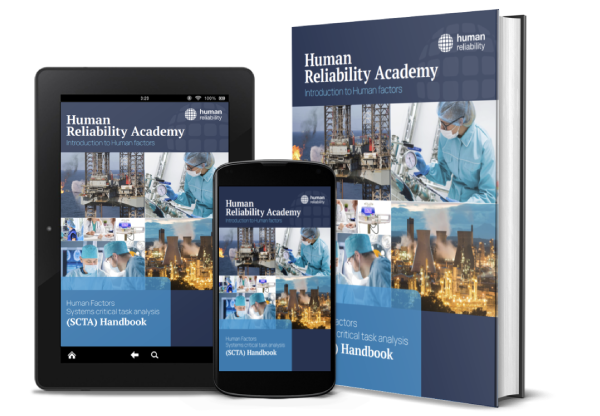Unique, expert insight and detailed analysis into a range of Human Factors-related topics. Never miss a new download by signing up to our newsletter.
This short and engaging handbook provides a great overview of human Factors Critical Task Reviews (HFCTR) and how it helps people across sectors reduce error and improve human performance. HFCTR can help keep people safe and delivers value.
This paper describes a set of techniques, supported by computer based tools, for predicting and preventing human errors in gas plant operations.
Human Reliability was commissioned by the Health & Safety Executive to carry out a survey of current industry practice in incident investigation, given the proposed new duty to investigate.
The first section of the paper discusses the relationship between `Best Practice` and formal procedures in high-risk systems such as chemical processing, aerospace and transportation.
The function of this document is to provide an overall framework within which to describe the important aspects of data collection systems.
Now, more than at any other time in the history of the railways, there is an urgent need for the industry to learn lessons from near misses and incidents.
A case study from the rail transportation sector illustrates how organisational factors can act as high-level influences which are manifest as operational errors giving rise to major accidents.
Performance Influencing Factors, or PIFs, are factors that combine with basic human error tendencies to create error-likely situations. In general terms PIFs can be described as those factors which determine the likelihood of error or effective human performance.
It is widely recognised that human error in industrial operations is a major source of risk that needs to be considered when plants are designed, modified or operated. The increasing interest in this area has arisen partly from the occurrence of a number of major accidents where human error has played a significant role.
Task analysis is a fundamental methodology in the assessment and reduction of human error. A wide variety of different task analysis methods exist, and it would be impracticable to describe all these techniques here. Instead, the intention is to describe representative methodologies applicable to different types of task.
The Human Factors GATEWAY approach is introduced to extend and expedite the application of HF learnings from a single Safety Critical Task Analysis (SCTA) to similar tasks. This approach uses a generic audit tool, enabling non-HF specialists to apply insights from SCTAs broadly and rapidly, thereby enhancing task safety and performance.
Get the latest newsletter by signing-up today





This free 30 minute mini-course will introduce you to Human Factors, and how critical task reviews are used to improve the quality and safety of tasks and processes across different industries.
It’s free, informative and you’ll even get a certificate of completion.


This short and engaging handbook provides a great overview of Human Factors Systems Critical Task Analysis (SCTA) and how it helps people across sectors reduce error and improve human performance.
SCTA can help keep people safe and delivers value.